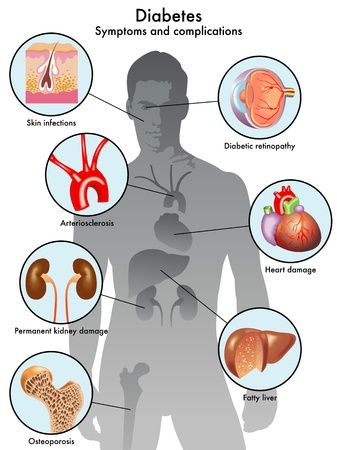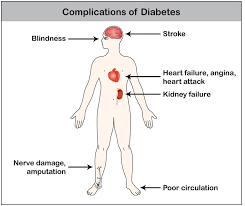The Reality of Retinopathy
(Please ignore typos/errors, I have a good excuse!)
I never meant to do this. It wasn’t supposed to go this far. This was not the person I ever imagined myself becoming. But I am here and it’s happening and I am terrified. I hit a concrete wall, smacked my face hard against a reality that despite being in front of me I did not see, literally could not see.
In the beginning I was just flirting. Experimenting with diets and slight adjustments to my insulin plan, a trim of some units, a lie here and a secret stashed away there, but it was nothing serious, I just wanted to lose a bit of weight and then I’d stop, right?
Here we about 17 years later. The start I mark as September 2001: the implementation of my back to school “diet which soon became bulimia, then anorexia, with spurts of Diabulimia and erratic blood sugar control throughout. I don’t know how I even got here. I can’t even understand how or why or where all those years went. I feel cheated. I am not this age, I did not live those years. It’s almost like I’ve been comatose as each day ad month fell into each other beneath a fog.
21 years of type 1 diabetes. Oh, it’s been a strained relationship, one of resentment and bitterness. I’ve pushed and I’ve kicked and I’ve denied its existence. Now it feels like it’s paying me back, reminding me of my neglect, the damage I’ve caused. It’s pointing and laughing and saying, “Ha! Thought you were invincible huh?”
In the past I’ve shrugged off the complications that have been caused by my eating disorder and diabetes. I’ve not been so bothered by them, and scare tactics or warnings relayed to me by health professionals, my friends or my family have had little effect. Part of it is because I don’t care much about myself, and partly because I have the tendency to put my head in the sand ingrained in me. So, I shrug things off and say oh it’s nothing serious or I am not worth the worry anyhow.
But when the issue is right ahead of you, blocking your view and pressing on your brain, it’s impossible to ignore. My eyes are failing me. I’ve had diagnosed retinopathy for a couple of years now and undergone 4 bouts of extensive laser surgery. I’ve had numerous floating islands and wispy strands of black appear at the backs of my eyes that have mostly dispersed gradually or been corrected by laser. sessions My left eye has always been worse and this time it is chief troublemaker. again.
During the evening of Friday 27th July, I noticed blurriness over my left field of vision and it seemed to gradually thicken throughout that evening. I struggled through Saturday hoping that it would break up and dissolve like the similar patches I’d had occur. But it stayed put and on Sunday seemed to be even more serious.
This prompted an A&E visit, a 7-hour long day, out of hours on call eye clinician, and relying on my patient brother to take me and stay with me. I was utterly exhausted by the end of it all.
The verdict was that I have a huge bleed right on the macular of my left eye and I cannot see anything besides blurriness out of that side. I was told they could do a procedure to break up the bleed but that nothing could be done outside of regular clinic hours and so I’d be given an urgent appointment that coming week.
Three appointments followed, and it was determined that I most likely needed to have a vitrectomy operation as the bleed was just too large to attempt anything less invasive. For that I was to be urgently referred to a London specialist hospital.
I waited, and I waited. Finally, the week before last, I chased them with a phone call to the London hospital. They had no recent record of me, they’d not heard a thing. I went back and forth and back and forth between secretaries and appointment staff on both sides and discovered that my local hospital had messed up big time. A letter has been written on the 10th and yet London hadn’t received it, and neither had I a copy of which I’d been expecting, suggesting this wasn’t just a case of lost mail within the system. It wasn’t sent. I eventually had to ask them to email it directly over and so the date it reached the intended destination was the 4th September. I now have to hold on an additional two weeks for their allowed response period. It’ a bit of a joke.
These are boring details, but hard to explain the current situation without the lead up. I started this blog with a centre to reach but have lost myself a bit. But that’s a fitting place to be. Lost. I feel so very lost at the moment.
I am wandering aimlessly, disoriented, dizzy, drifting and confused. From my left eye the sky is only indistinguishable by colour and direction, from the ground. I can see a waving hand but not the number of fingers held up. I can see a bright light but no letters on the reading chart. I look at a word, or a sentence and the middle part is all mixed up with pieces missing. Then today, actually within the last 3 hours I can now see a black inky puddle floating ahead of my right side of vision. Just…. no.
This is me admitting I am scared. This time I am fretful. It has been raining heavily for a decade but the damp is only just soaking and sinking in.
I am a reader and a writer. Those two things are what I love to do. I feel stunted. All I am doing is watching endless TV shows, as I can see moving shapes as long as there’s no text. I can’t work at the charity shop I usually volunteer at because I am not safe. I am clumsy and have broken too many dishes and dropped so many items over the last month or so. I struggle to read cooking instruction labels and unscramble the digits of telephone numbers. Typing is made easier, with autocorrect and spell check but it is an effort and mentally exhausting. I won’t manage to proof-read this, so please forgive any mistakes for which there may be plenty. I guess I just wanted to put some words to screen because that is possible as far as I can mostly make out which letters are where with my right eye and from memory. Checking back over it is harder.
I want to take it all back. I wish I could time travel and be able to shake my naive 14-year-old self back to sense, right at the moment I stepped over the edge. Like I said, I didn’t mean to do this. I was only trying things out. By this age, I would have a career and a relationship, maybe a family. I’d be successful and able to be a proper adult. That was the plan. But it’s faded to dust in my hands. I want to rewind and stop myself right at that line that was crossed. I want to say,
“It’s not worth it, it’s a trap, come back, talk to someone, get help.”







